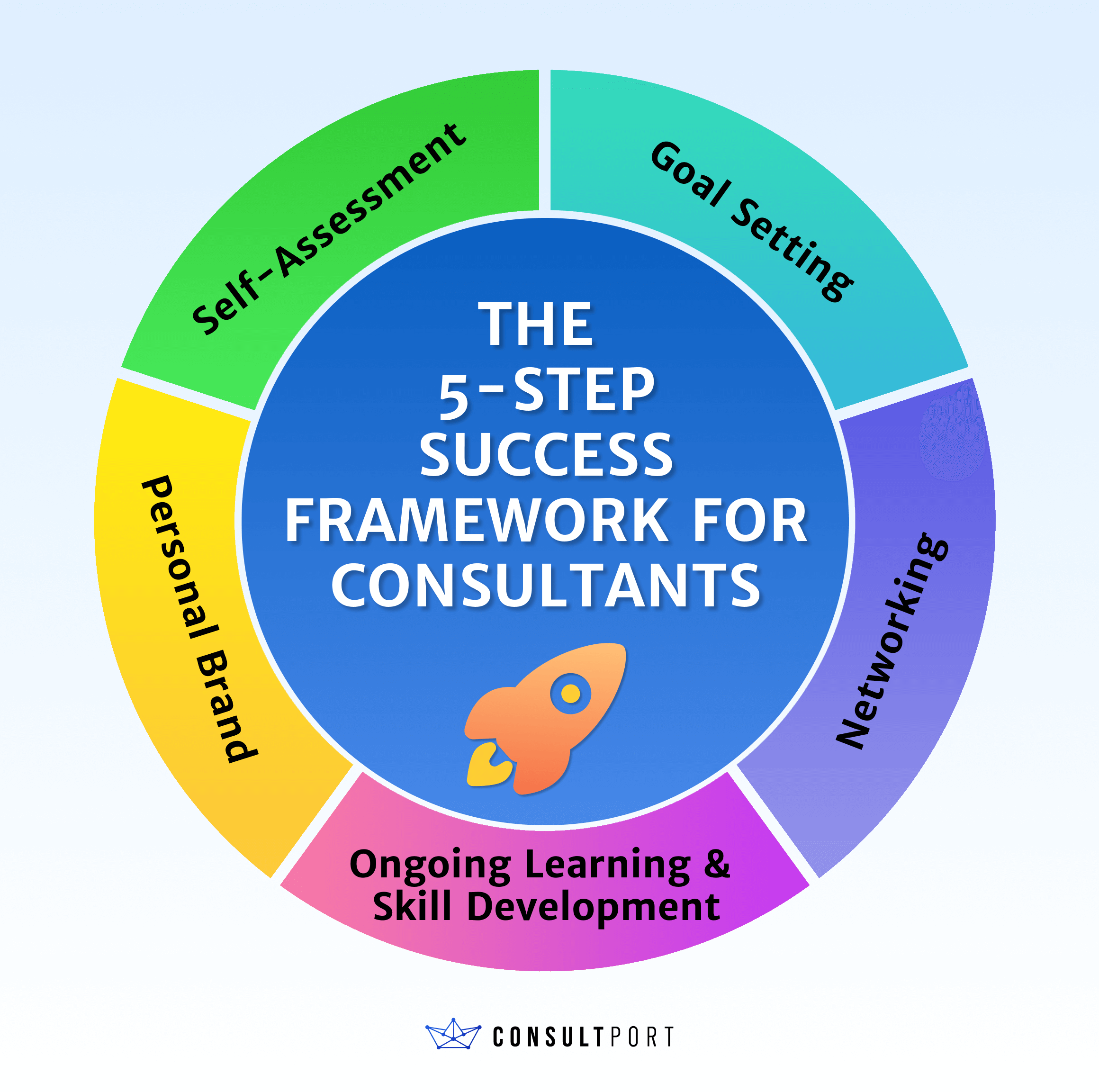Succeed in Consulting: The 5-Step Framework for Consultants
Blog Categories:
Published:
November 11, 2023
Reading Time:
7 minutes

Have you ever wondered what sets the most successful consultants apart in the world of consulting? Did you know that your path to success in this field begins with a journey of self-awareness and strategic self-improvement?
You see, in a profession where adaptability and expertise are paramount, it’s important to follow a framework for success. In this article, we’ll discuss a 5-step framework that consultants can use to stay ahead of the curve. Keep in mind that you can add or remove elements from this framework. As in, it’s not set in stone. However, it has all you need to get you started.
Whether you’re a newbie consultant who’s still deciding future career moves or a seasoned one planning your next big breakthrough, this article can be of great value to you.
So, let’s dive into it.
You see, in a profession where adaptability and expertise are paramount, it’s important to follow a framework for success. In this article, we’ll discuss a 5-step framework that consultants can use to stay ahead of the curve. Keep in mind that you can add or remove elements from this framework. As in, it’s not set in stone. However, it has all you need to get you started.
Whether you’re a newbie consultant who’s still deciding future career moves or a seasoned one planning your next big breakthrough, this article can be of great value to you.
So, let’s dive into it.
KEY TAKEAWAYS
- Self-assessment is the foundational step for a successful consulting career. Start with recognizing your strengths and weaknesses.
1. Self-Assessment
A successful career in consulting begins with self-awareness. You see, there may be specific tasks that you can accomplish better than others. And there may be certain areas in which you may be weaker than others. You should know about the things you’re good at and strive to get even better. So, sit down, relax, and assess your strengths and weaknesses.

Here are some questions you could ask yourself:

Here are some questions you could ask yourself:
- What are my consulting skills and how do they contribute to my success?
- Which projects have showcased my consulting abilities?
- Have I acquired any certifications or formal training that enhance my expertise?
- Do clients or colleagues highlight any specific abilities in me?
- Are my soft skills, like communication and adaptability, assets in my consulting journey?
Example
As an example, let's say you excel in data analysis. You have proved this by completing successful projects where you helped clients develop merger and acquisition strategies. Now, you know that you’re really good at data analytics and M&A. However, some other projects that revolved around foreign expansion and market entry didn’t appeal to you much. This means you should double down on your strengths and focus on a career in M&A.2. Goal Setting
This is a no-brainer. If you don’t have specific goals in your career, you may end up drifting around in the same type of roles. This is why setting SMART (Specific, Measurable, Achievable, Relevant, Time-bound) career goals is crucial.
Also, you need to be as specific and realistic as possible while setting goals. To make it more professional, add a timeline to it, too. Need some more help setting goals? Well, let’s consider some examples.
Also, you need to be as specific and realistic as possible while setting goals. To make it more professional, add a timeline to it, too. Need some more help setting goals? Well, let’s consider some examples.
Example
- Goal #1: Complete the Business & Corporate Strategy Bootcamp and achieve certification within the next 3 months to enhance my knowledge of business strategy frameworks.
- Goal #2: Publish four well-researched and insightful industry articles on reputable platforms in 6 months to establish myself as a thought leader.
- Goal #3: Diversify my income by securing three new retainer contracts with clients from the manufacturing sector within the next 8 months.
3. Ongoing Learning and Skill Development
In the dynamic world of consulting, staying at the forefront of industry developments is not just an advantage—it's a necessity. New trends and technologies are always emerging, and that’s why continuous learning is what makes you a valuable consultant. Whether it’s learning how to use the latest CRM platform or reading industry white papers to expand your knowledge, you should always be learning new things.Here are certain steps that you could take:
- Take short consulting-related courses to save time instead of going for diplomas or degrees that could go on for years.
- Get used to the latest software and tech platforms in your industry.
- Attend workshops and webinars to gain practical insights and industry trends.
- Pursue certifications that are highly sought after in your consulting niche.
- Participate in practical, hands-on training that allows you to directly apply the knowledge and skills you're learning in real-world scenarios.
Example
Let’s suppose you're a data analytics consultant looking to expand your expertise in handling client data more efficiently. You decide to take a course to learn the new CRM platform tailored for data analytics. During this training, you actively work with the CRM system, importing and manipulating data, creating customized reports, and interpreting the results. This practical experience equips you to navigate the complexities of client data effectively and you are able to produce better results for clients.4. Networking
You may have heard of the saying, “Your network is your net worth.” Well, this applies to the consulting industry as well. It’s not always about what you know—sometimes, it’s about who you know. All those self-assessment sessions and certifications may be of no use if you don’t know the right people. Surely, once you’ve created a strong personal brand, things get much easier.
However, at least initially, networking and relationship building is very important to your success as a consultant. So, let’s discuss some ways to expand your network.
- Connect with peers, clients, and industry experts: Forge connections with colleagues, clients, and subject matter experts in your field. Engaging in conversations with peers can lead to collaborations and shared insights while connecting with potential clients can foster trust and loyalty.
- Attend conferences: Industry conferences are not just gatherings—they are hubs of inspiration and possibilities. These events are where you get to meet new clients, enthusiastic colleagues, and individuals who can become key collaborators. So, whenever you get a chance, put your best clothes on and go attend these events.
- Leverage online forums and social media: Can’t attend in-person seminars and conferences? No problem. Platforms like LinkedIn can be your digital stage for expanding your professional network. Use them to engage with industry peers and share your expertise through value-packed articles and posts.
Example
Imagine this: You’ve been working as a senior consultant at a leading digital agency, but now, you want to leave those long hours behind and spend more time with family. Then, you attend a digital transformation seminar where you meet a client who’d like to hire you on a freelance basis. You get to choose your hours, fees, and location. So, you begin your freelance consulting journey and leave the corporate world behind—still making a decent income.5. Personal Brand
Personal brand isn’t just important for celebrities. Even in the ever-changing world of consulting, your personal brand is your signature move. It's the spotlight that sets you apart in the crowded arena of professionals. Here's how you can craft and elevate your personal brand:
- Define your expertise: Discover your consulting superpower. Are you the strategic visionary, data dynamo, digital expert, or master of change?
- Showcase your skills: Let people know that you’re an expert. Share your thoughts and insights on social media, blogs, and live events.
- Case studies: Your future clients would want to know how you’ve helped your previous clients. As the saying goes, “The proof is in the pudding.” This is why you should create compelling case studies and demonstrate your abilities through your previous results.
- Testimonials: What others say about you is as important as what you say about yourself. This is why you should have testimonials from influential people. In consulting, this could be your clients or seniors from the past. It’s also crucial to get comprehensive testimonials that depict your work ethic, consulting skills, knowledge, and soft skills in detail.
Example
Let’s suppose that you're a strategy consultant with 10 years of experience. Since short videos are trending right now, you decide to make a series of 30-second videos answering the most asked questions in your industry. Soon, your following increases and you become a thought leader in the industry. Your lead generation goes on autopilot and new clients approach you routinely. All this is doable with a strong personal brand.Final Thoughts
And that brings us to the end of this article. Remember to start by assessing yourself instead of following someone else blindly. Then, set SMART goals. You know, the ones that are realistic and achievable in a given time. Furthermore, learning new skills and networking should be an ongoing process—get used to it. And finally, focus on building a strong personal brand.
By the way, if you’re a consultant who has worked for top consulting firms, leading digital agencies, or blue-chip companies, we can help you find freelance work. Here at Consultport, we have over 10,000 top-tier consultants in our talent pool. Want to be one of them? Get in touch with us now. Your next high-paying, freelance project might be a few clicks away.
By the way, if you’re a consultant who has worked for top consulting firms, leading digital agencies, or blue-chip companies, we can help you find freelance work. Here at Consultport, we have over 10,000 top-tier consultants in our talent pool. Want to be one of them? Get in touch with us now. Your next high-paying, freelance project might be a few clicks away.
Share This Story, Choose Your Platform!




